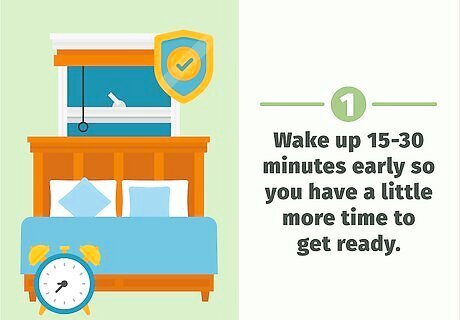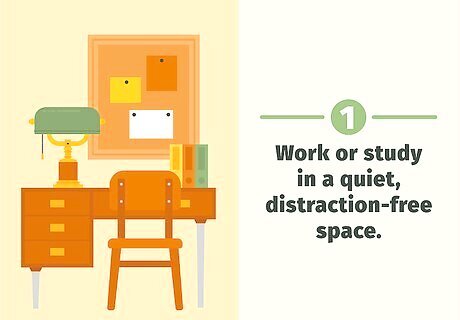
views
Time Management

Wake up 15-30 minutes early so you have a little more time to get ready. If you're usually rushing around, set your alarm earlier so you have plenty of time to wake up and prepare for the day. Adjust your wake-up time gradually, so you don’t feel as tired when your alarm goes off in the morning. For instance, if you usually wake up at 7:00 AM, wake up at 6:45 instead. It can help to plug in your alarm on the opposite side of the room, so you have to get out of bed to turn it off. If you aren’t a fan of blaring alarms, try a light-up alarm clock instead.

Create a to-do list for yourself each day. Your daily schedule may feel pretty overwhelming, especially if you’re juggling AP classes, extracurriculars, and other responsibilities. There’s no need to stress—each day, write a list of everything you need to get done that day. Put the really important tasks first, and focus on getting those done before anything else. For instance, you might have “Finish science project” or “Study for history test” at the top of your list. Getting through a to-do list can be daunting. Give yourself a reward once you make through some of the big points on your list!

Design a weekly schedule for yourself. Envision how your average school week usually goes, whether you’re studying, doing extracurriculars, or balancing extra responsibilities at home. Develop a weekly schedule, so you have a visual reference for what you need to do each day. This way, you’ll also know when you have some free time! A calendar or planner is a great way to manage your schedule. Apps like Google Calendar and My Life Organizer can also be a big help. Color-coding is a great way to organize your weekly schedule! Assign different colors for your schoolwork, extracurriculars, sports, and other responsibilities.

Dedicate a certain time of the day to homework and studying. Don’t try to fit your schoolwork in throughout the day—instead, set aside some time where you’re only focusing on your homework. During this time, silence your phone and stay off the web until you’ve gotten your work done. For example, you might side aside 1-2 hours after dinner to focus on your upcoming tests and nightly homework.

Take breaks throughout the day. Marathon study sessions and big homework assignments can be really daunting, especially when you’re managing a lot of tough classes at once. Throughout your homework and study time, give your brain a break. Make a goal to take a 15-20 minute break every 50-90 minutes. Grab a snack, take a walk—just step away from your screen so you aren’t focusing on school. Many people find that 17 minutes is a great break length.

Get a good night’s sleep. Set a regular bedtime for yourself so you can get at least 8-9 hours of sleep each night. Don’t eat a really big meal or drink any caffeinated beverages close to your bedtime—these can make it tricky to fall asleep. Try going to bed at the same time each night, so you wake up feeling refreshed and ready for school. Generally, school-aged kids need around 9-11 hours of sleep each night, while teens need 8-10 hours. It’s okay if you don’t get everything done in 1 day. Instead, shift your unfinished tasks and responsibilities for the next day.
Homeschool Routine

Work or study in a quiet, distraction-free space. Staying productive can be tricky, especially if other members of your household are stuck at home. Find an open, quiet area where you can focus on your schoolwork, like a desk in your bedroom or a coffee table in your living room. Don’t do any schoolwork on your bed—this can make it harder for you to relax and unwind when it’s time for bed.

Follow your assigned learning plan. Take a look at your learning plan for the week, whether it was created by your teacher or your parents or guardians. Focus on the assignments and exams that are due right away, so you can stay on track with each of your classes. Talk to your fellow online classmates and see if they’d be interested in studying with you.

Get some fresh air during your school day. Head outside a few times each day so you can stretch your legs and stay energized. Go for a walk around your neighborhood, or hop on your bike to get your blood pumping a little bit. Try to head outside at least twice a day, so you don’t feel too cooped up. If the weather isn’t great, you can always dance around to your favorite songs at home.

Eat healthy meals and snacks throughout the day. Give yourself time to refuel during the school day. It can be really easy to feel burned out, especially when you’re doing everything at home. Choose healthy, nutritious snacks, like carrots and celery sticks, apples, pears, or roasted chickpeas. For instance, you might eat dinner at 5:30 PM, or stop for lunch at 12:00 PM sharp.

Spend time with your friends and loved ones. It’s understandable if you’re developing cabin fever when you’re learning from home. Don’t worry! Set aside some time each day to call or video chat with your friends and family, so you can stay connected.

Focus on the positives throughout the day. Staying at home can really take a toll on your spirit, especially if you’re surrounded by the stress and negativity of COVID-19. Search online for happy, encouraging stories of people lending one another a helping hand. You can also practice gratitude—this is where you focus on what you’re thankful for in your life, even if things aren’t quite going as planned.



















Comments
0 comment